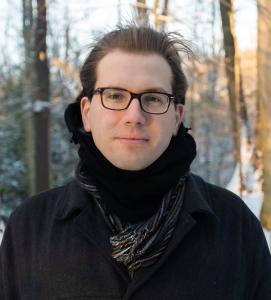Kristóf Oltvai

Contact
Kristóf is a PhD student of theology in the Divinity school, and he is interested in European philosophy and Christian theology.
What does your work focus on / revolve around?
At its broadest level, my work deals with the historical and conceptual relationships between European philosophy and Christian theology. More specifically, though, I am interested in how the notion of revelation causes difficulties in adjudicating these two discourses' limits. I have worked some on 20th-century figures, but my current project is more intensely focused on late-medieval and early modern philosophical theology, particularly in the context of the intellectual background and consequences of the Protestant Reformation. I hope this project contributes to a better understanding of modernity: an epoch inseparable, in my view, from the Reformation's theological achievement.
Why study religion? / Why is what you study important?
John Calvin famously said that "the human heart is a factory of idols." This is an anthropological observation: for Calvin, we are homo religiosus. We all have our gods, whether that is wealth, fame, the family, the nation, or the self. To understand 'religion' is thus to understand human beings' motivations, fixations, and obsessions. For this reason, I am convinced that religious literacy is important for the same reasons that one should be familiar with literature, art, and philosophy. Without a knowledge of these, one finds oneself in a world whose history and inner logic have become totally opaque.
Describe an experience at the Divinity School that made you excited to learn here
I vividly remember the last lecture of a course I took with Professor Jean-Luc Marion as a master's student, entitled something like "Questions about the Concept of Revelation." We had somewhat fallen behind schedule, so Professor Marion really picked up the slack, taking us on a tour de force of all the major Christian theorists of revelation in the 20th century: Barth, Bultmann, Moltmann, and von Balthasar, subjecting them to comparison and critique. He spoke for three hours straight and built the rhetorical tension expertly: you could've heard a pin drop. I remember the conclusion was something like, "revelation is not history, for the earth is but one point on the face of Christ." The class broke into spontaneous applause. I think we all had the sense of having witnessed an intellectual event of the first order.
What is an aspect of life at the Divinity School or in Hyde Park that you enjoy?
The 4-8, which is a quarterly party for the whole School, is always a grand old time. As for Hyde Park, one comes to love the idiosyncrasies of the residents, which rivals that of the equally quirky undergraduates. To be called a "Hyde Parker" is a badge of honor. The history of our neighborhood, defined as much by the University as by being the center of Chicago's Black elite, is deep, complex, and unique. Hyde Park also holds unique opportunities for the scholar of religion. In addition to the Divinity School, the Lutheran School of Theology, Chicago Theological Seminary, the Catholic Theological Union, and the Lumen Christi Institute are all located here. I have particularly benefited from the last of these during my time as a student.

